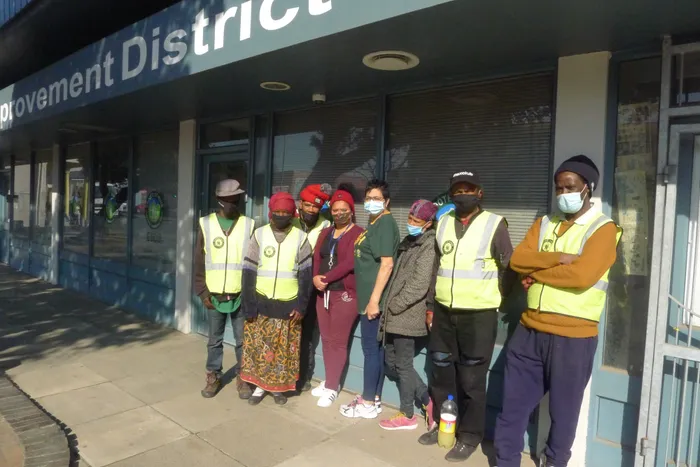Homeless not forgotten in vaccination drive

Homeless people are part of the GSCID’s cleaning programme.
The homeless are being included in the drive to get Covid-19 jabs into arms despite many not having IDs or knowing their birth dates.
Non-profit organisations and shelters are helping to inform the homeless about the vaccines and get them registered on the Electronic Vaccination Data System (EVDS). Those with no documents can also register using paper forms instead of having to go online.
Groote Schuur Community Improvement District Centre (GSCID) social outreach manager Ingrid Frieslaar works with the 50-odd people whom she says lives on the streets between Groote Schuur Hospital and Newlands Swimming Pool. Half of them are part of the GSCID’s cleaning programme.
At first, she thought the homeless not having IDs or knowing their birth dates would be a hurdle to them getting vaccinated.
“We then made a plan for some of the homeless to register for a temporary ID at Home Affairs,” she said.
Homeless people often lost their IDs while living on the streets and some had no relatives who could tell them their birth dates, making it hard for them to get documents. However, the department was making provision for all undocumented homeless, she said.
“Vaccine awareness is spread to more people on the streets through word-of-mouth. Homeless people are usually clued up about what is happening in society and will seek advice from GSCID or shelters,” she said.
Provincial Department of Health spokesman Mark van der Heever said those with no documents could be registered for vaccination using a paper form.
“This registration will be captured on the EVDS under the ’undocumented’ section. All available information about the person will be added. They will also be issued with vaccination cards, same as everyone else.”
The undocumented homeless would be prioritised for single-dose J&J vaccines, depending on the vaccination site’s stock availability, he said.
“Our teams have already started visiting sites and have identified their routes. They will be going into communities more regularly now. The logistics are initially arranged via a shelter or NGO, but our teams will also be doing outreach to those who are not linked to these establishments.”
Randall du Plooy, 55, who lives on the street in Rondebosch, said: “I am going to get the vaccine even though I do not have an ID yet. I am not scared of getting the virus, because I sleep on the streets, and I am exposed to everything and have a stronger immune system.”
However, despite believing that he had a stronger immune system, he said still felt it was important to get the vaccine.
Thomas Kroukamp, 58, also lives on Rondebosch’s streets. He said: “I don't want the Covid-19 virus to get me down, although I never had it before. Our immune systems are also definitely stronger because we eat anything.”
The Haven Night Shelter’s chief executive Hassan Khan said: “We haven't had much experience of the homeless having a difficult time to get vaccinated because of not having an ID. The majority of our clients and staff of all the Haven shelters are currently getting vaccinated. Also, the first thing done by the Haven shelter when a homeless person comes in, is helping them get their ID again.
“We are currently assisting the homeless with registration and making them aware of when and where they can get vaccinated.”
Mr Khan said that while there was talk of the homeless coming through Covid-19 better than others, he could not say whether that was born out by statistical evidence.
Reed Street clinic manager Murdock Horne led a vaccination drive at a homeless shelter in Bellville on Friday August 6, where 50 people got the one-dose Johnson & Johnson shots.
Shelter residents were part of the community and needed to be cared for and protected from the virus, he stressed.
“There are cases where people from shelters may not feel like they’re part of their community, but we were there to vaccinate them for their health and to make them feel a part of this community, as well as the general population.”

